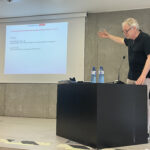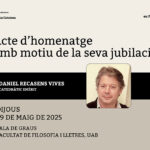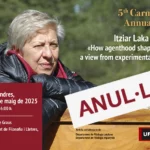20 juny, 2019
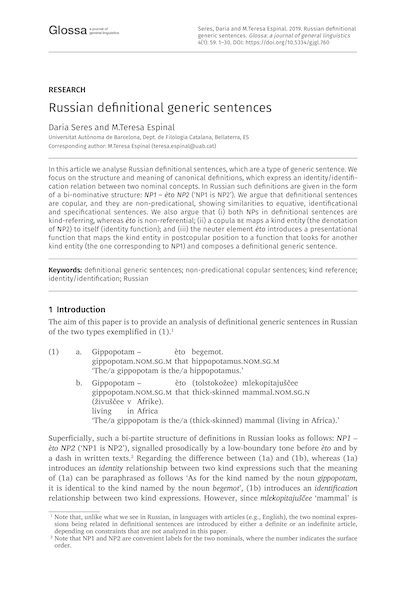
Autors:
Dària Serés, M.Teresa Espinal
Títol:
Russian definitional generic sentencesEditorial: Glossa: A Journal of General Linguistics, 4(1). Ubiquity Press
Data de publicació: 14 de juny de 2019
Pàgines: 30 Més informació
Text completIn this article we analyse Russian definitional sentences, which are a type of generic sentence. We focus on the structure and meaning of canonical definitions, which express an identity/identification relation between two nominal concepts. In Russian such definitions are given in the form of a bi-nominative structure: NP1 – èto NP2 (‘NP1 is NP2’). We argue that definitional sentences are copular, and they are non-predicational, showing similarities to equative, identificational and specificational sentences. We also argue that (i) both NPs in definitional sentences are kind-referring, whereas èto is non-referential; (ii) a copula be maps a kind entity (the denotation of NP2) to itself (identity function); and (iii) the neuter element èto introduces a presentational function that maps the kind entity in postcopular position to a function that looks for another kind entity (the one corresponding to NP1) and composes a definitional generic sentence.
28 octubre, 2020

Autors:
Olga Borik, Joan Borràs-Comes & Dària Serés
Títol:
Preverbal (in)definites in Russian: An experimental study, chapter 3 in K. Balogh, A. Latrouite & R. D. Van Valin, Jr (eds.) Nominal anchoringEditorial: Language Science Press
Data de publicació: 2020
Més informació
Text completThis paper presents an experimental investigation aimed at determining the exact nature of the relationship between type of interpretation (definite or indefinite) and linear position (pre- or postverbal) of bare nominal subjects of intransitive predi- cates in Russian. The results of our experiment confirm that preverbal position correlates with a definite interpretation, and postverbal position with an indefinite interpretation. However, we also discovered that the acceptance rate of preverbal indefinites is reasonably high. We suggest an explanation for the appearance of indefinites in preverbal subject position in terms of lexical accessibility, which is couched in general terms of D-linking.
6 juny, 2023
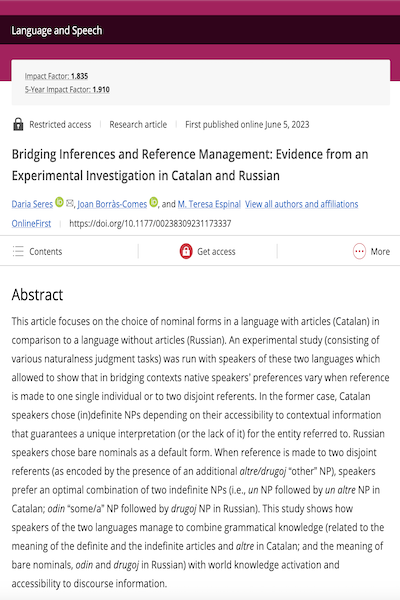
Autors:
Dària Serés, Joan Borràs-Comes & M.Teresa Espinal
Títol:
Bridging Inferences and Reference Management: Evidence from an Experimental Investigation in Catalan and RussianEditorial: Language and Speech (Sage Journals)
Data de publicació: 5 juny, 2023
Més informacióThis article focuses on the choice of nominal forms in a language with articles (Catalan) in comparison to a language without articles (Russian). An experimental study (consisting of various naturalness judgment tasks) was run with speakers of these two languages which allowed to show that in bridging contexts native speakers’ preferences vary when reference is made to one single individual or to two disjoint referents. In the former case, Catalan speakers chose (in)definite NPs depending on their accessibility to contextual information that guarantees a unique interpretation (or the lack of it) for the entity referred to. Russian speakers chose bare nominals as a default form. When reference is made to two disjoint referents (as encoded by the presence of an additional altre/drugoj “other” NP), speakers prefer an optimal combination of two indefinite NPs (i.e., un NP followed by un altre NP in Catalan; odin “some/a” NP followed by drugoj NP in Russian). This study shows how speakers of the two languages manage to combine grammatical knowledge (related to the meaning of the definite and the indefinite articles and altre in Catalan; and the meaning of bare nominals, odin and drugoj in Russian) with world knowledge activation and accessibility to discourse information.




